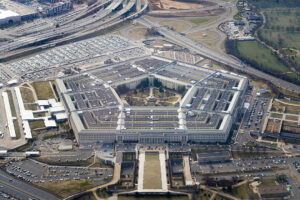WASHINGTON – US Defense Secretary Lloyd Austin said on Tuesday it was a moral and strategic imperative to protect Palestinian civilians in the war between Israel and Hamas and that the humanitarian catastrophe in besieged Gaza was getting worse.
Austin was speaking during a meeting with Israel Defense Minister Yoav Gallant at the Pentagon as relations between U.S. President Joe Biden and Israeli Prime Minister Benjamin Netanyahu sank to a wartime low.
“In Gaza today, the number of civilian casualties is far too high and the amount of humanitarian aid is far too low,” Austin said, sitting across from Mr. Gallant, a key architect of the military campaign against Hamas in response to the militants’ Oct. 7 cross-border rampage that Israel says killed 1,200 people.
“Gaza is suffering a humanitarian catastrophe and the situation is getting even worse,” Mr. Austin said, using some of his most forceful language so far.
The Pentagon later said Mr. Austin’s discussion with Mr. Gallant was frank and direct.
The Israeli defense minister also met for a second day with US national security adviser Jake Sullivan, who told Gallant that Israel needs to increase the flow of humanitarian aid to Gaza, White House spokesperson Karine Jean-Pierre said.
Mr. Gallant later held talks with CIA Director William Burns, recently returned from talks in Qatar seeking an elusive deal for Hamas’ release of more than 130 hostages still held in Gaza.
Speaking to reporters, Mr. Gallant, apparently seeking to cool US-Israeli tensions, said he stressed the importance of US ties to his country’s security and of maintaining Israel’s qualitative military edge in the region, including its air capabilities.
“We share 100% of the values and 99% of the interests with the United States,” Mr. Gallant said.
Mr. Biden has come under pressure from human right groups and some fellow Democrats to condition further military aid on Netanyahu holding off on a threatened offensive in the southern Gaza city of Rafah, where more than a million Palestinians are sheltering. The US president has resisted doing so.
FEARS OF FAMINE
Israel has launched strikes and shelling in Gaza that have killed more than 32,000 Palestinians, according to the health authorities in the Hamas-run enclave.
“We need immediate increases in assistance to avert famine,” Mr. Austin said.
A senior US defense official, speaking on the condition of anonymity, said more aid was now flowing through land crossings and that about 200 trucks were crossing into Gaza daily.
Mr. Gallant’s meeting with Mr. Austin took place after Netanyahu on Monday canceled a separate visit to Washington by two senior aides due to hear US ideas about operational alternatives in Rafah.
Netanyahu’s fraught relations with Mr. Biden became even more strained over Washington’s decision not to veto a U.N. Security Council resolution seeking an immediate ceasefire in Gaza. The United States has been working to get Netanyahu to consider other options instead of a ground invasion of Rafah, the last relatively safe haven for Palestinian civilians.
Austin said he was ready to discuss alternate approaches to targeting Hamas militants there.
The senior defense official said Austin discussed potential steps like Israel’s precision targeting of Hamas fighters in the southern city on Gaza’s border with Egypt.
The threat of such an offensive has increased differences between close allies the United States and Israel, and raised questions about whether the US might restrict military aid if Netanyahu defies Mr. Biden and presses ahead anyway.
Mr. Gallant emphasized that while he had discussed humanitarian aid, he had also made clear Israel’s plan to go ahead with efforts to destroy Hamas, saying it was necessary to deter “common enemies,” an apparent reference to Iran. Hamas, he said, still has five battalions operating in Rafah.
Mr. Austin said the security bond between Israel and the United States was “unshakeable”. “The United States is Israel’s closest friend and that won’t change,” he added. – Reuters

